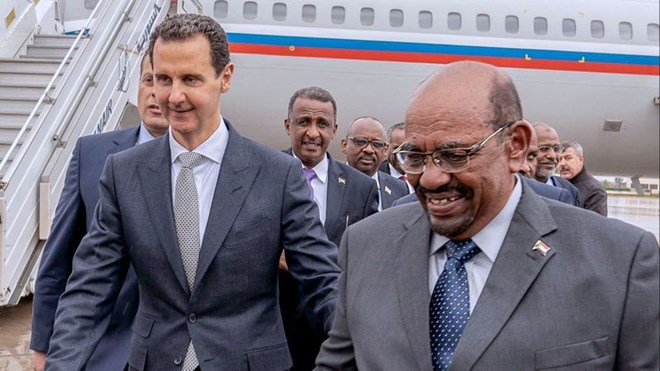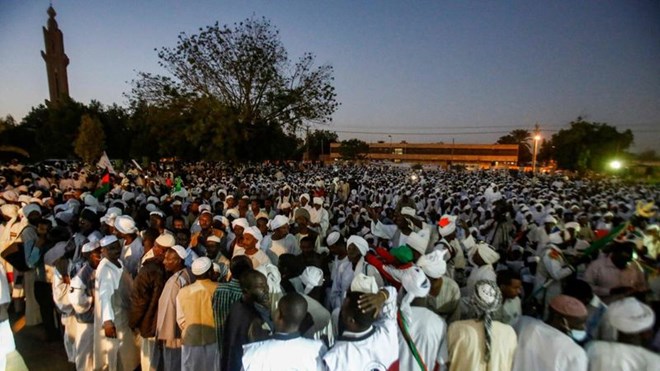
Monday December 24, 2018
By Associated Press

Sudanese President Omar Hassan Ahmed Bashir, right, arrives in Damascus, Syria, on Dec. 16 for an official visit with President Bashar Assad, left, in a photo from the state-run Syrian Arab News Agency. (Syrian Arab News Agency / EPA)
Sudan's military on Sunday pledged to stand by President Omar Hassan Ahmed Bashir, according to a tweet by the country's state news agency, during ongoing street protests decrying worsening economic conditions and demanding that the autocratic leader step down.
"The armed forces assert that it stands behind its leadership and its keen interest in safeguarding the people's achievements and the nation's security, safety along with its blood, honor and assets," said the tweet, quoting a military statement.
Bashir hails from the military establishment, which has dominated the country in the six decades since independence from Anglo-Egyptian rule in 1956. The Sudanese president was an army brigadier-general when he joined forces with Islamists to seize power in a 1989 military coup that toppled a freely elected but ineffective government.
In 2009 and 2010, the International Criminal Court issued arrest warrants on genocide and war crimes charges for Bashir over the Darfur region conflict that killed hundreds of thousands; other nations have refused to arrest him.
Sunday’s military statement supporting Bashir came as opposition to the autocratic leader mounted and violent street protests continued in a string of cities across the country.
On Sunday, an umbrella coalition of professional unions said the nation's doctors will go on an indefinite strike that is expected to be the first of a series of work stoppages amid protests calling on Bashir to step down.
The coalition said the doctors will continue to deal with emergencies during the strike, which begins Monday and aims to "paralyze" the government and deny it much-needed revenues. The coalition statement also called on citizens to continue street protests, which entered their fifth day Sunday, according to activists, with demonstrations in several cities.
There have also been calls by a number of independent trade and professional unions for a general strike on Wednesday.
The protests are chiefly over the rising prices and shortages of food and fuel. A steep rise decreed last week in the price of bread, a main staple for most Sudanese, proved to be the final straw. The protests prompted authorities to suspend classes in schools and universities in a string of cities, including the capital, Khartoum, and to impose a nighttime curfew in some of them.
Authorities on Saturday detained more than a dozen opposition leaders, including one who is in his 80s.
On Sunday, according to Sudanese activists, protests took place in several cities. In the railway city of Atbara, north of Khartoum, police used tear gas and batons to disperse nearly a 1,000 demonstrators, according to the activists, who spoke on condition of anonymity for fear of reprisals.
Participants in the protests have so far numbered in the hundreds or low thousands in each location, but their continuation for nearly a week despite the use of force by police suggests the level of popular discontent over Bashir's rule is at a dangerously high level.
Opposition leader Sadek Mahdi, who led the democratically elected government ousted by Bashir in the 1989 coup, told reporters Saturday that as many as 22 people were killed in clashes with police since the protests began.

Supporters of Sadek Mahdi, Sudan's ex-prime minister and opposition leader, gather as he addresses them in a mosque in Omdurman on Dec. 19 after his return from exile. (Ashraf Shazly / AFP/Getty Images)
The government has acknowledged fatalities in the protests but provided no figures.
Mahdi returned home last week from a year in exile abroad; thousands of his supporters welcomed him. Addressing a news conference Saturday, he said the protests were legitimate and that he supported a "peaceful change" of government.
Bashir, who is in his mid-70s, has in the past ordered the use of force against protesters — including in the last round of unrest in January — successfully crushing them to remain one of the longest serving leaders in the region. Although his time at the helm has seen Sudan plunging into one crisis after another, he is seeking a new term in office. Lawmakers loyal to him are already campaigning to rally support for constitutional amendments that would allow him to run in the 2020 election.
On Saturday, the emir of the wealthy Gulf state of Qatar, Sheikh Tamim bin Hamad al Thani, spoke to Bashir by phone, lending his support and offering aid, Sudan's state news agency reported.
Qatar is at sharp odds with some of Sudan's key Arab backers, including Saudi Arabia, the United Arab Emirates and Egypt. Qatar's aid offer, the details of which are yet to be announced, could either discourage those allies from helping Bashir ride out the current crisis or, to the benefit of Sudan, prompt them to match Qatar's aid or even outdo it.
Sudan's economy has struggled for most of Bashir's rule, which has failed to unite or keep the peace in the religiously and ethnically diverse nation, losing three-quarters of the country's oil wealth when the mainly animist and Christian south seceded in 2011.